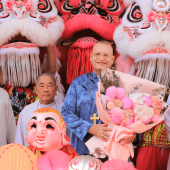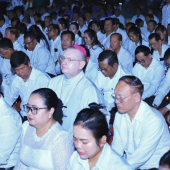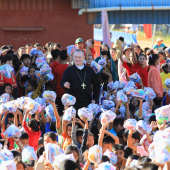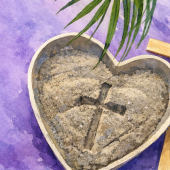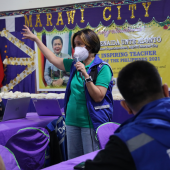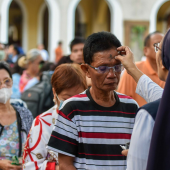Sotheara Chhim: Healer of mental illness in Cambodia
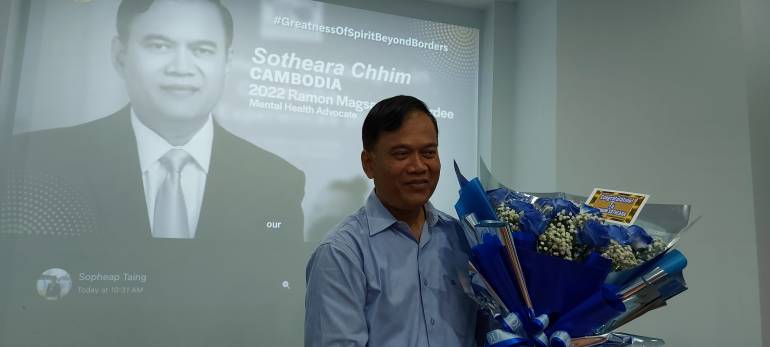
Sotheara Chhim, one of the four laureates of the 64th Ramon Magsaysay Award, has been treating the Cambodians' unique trauma and baksbat (broken courage).
One of the survivors of the Khmer Rouge, Sotheara, a Cambodian, is a psychiatrist and mental health advocate for his country’s persons with mental illness.
Sotheara, 54, was driven to help Cambodians who were mentally and psychologically ill. He witnessed the Khmer Rouge regime's atrocities as a child.
During its four-year reign, the Khmer Rouge (1975–1979) was one of the worst mass killers of the twentieth century, killing over two million people.
Sotheara’s mother foresaw the physical and psychological suffering of the post-war Cambodian people and encouraged him to be a physician to serve his country.
"My mother wanted me to study medical science as she saw that many people who survived the Khmer Rouge regime were sick—physically and mentally. Many doctors were killed during that time–as far as I know, in 1979, there were about 40 doctors in the country. It was a bad time to be unwell," he stated.
Sotheara told Dr. Guislain Museum, "After experiencing the aftermath of the Khmer Rouge regime and the lack of mental health care, I was inspired to pursue my lifelong passion of helping people by becoming one of the first psychiatrists in Cambodia."
As the Transcultural Psychosocial Organization in Cambodia (TPO) reported, "Cambodia is a country where the population is at a high risk of poor mental health."
About 40% of Cambodians are experiencing mental health and psychological issues, with a high level of post-traumatic stress disorder (PTSD) and a high rate of suicide globally.
After one year of his graduation from the University of Health Sciences, in 1993, he decided to work with mentally sick patients in Kampong Chhnang province as a volunteer.
Sotheara recalled, "At that time, there were only about 10 professional psychologists in a country in which about eight million people had post-traumatic-related mental health problems. As 80 percent of these were located in rural areas, it was extremely difficult for them to seek psychological treatment."
In Cambodia, only 2% of health centers (18 out of 967) provide mental health services to outpatients, and only two psychiatric inpatient units with 14 beds are available for the 15 million population.
He recalled his first experience with mentally sick patients, "I met some patients who wanted to commit suicide. I saw people walking into the center crying and laughing simultaneously—people nearby would think they were possessed by an evil spirit."
TPO Cambodia was officially registered by the Ministry of Interior in 2000 and provided treatment to a total of 240,000 patients in the country.
While he was working with TPO Cambodia, he gained his Master’s in Psychological Medicine in New South Wales and pursued his Doctoral degree at Monash University in Melbourne, Australia, in 2012.
Sotheara told The Phnom Phem Post, "In 2000, after completing my Master’s degree in psychological medicine from the University of New South Wales in Sydney, I decided I would like to work for TPO Cambodia."
Every year, TPO Cambodia provides treatments for about 10,000 mentally ill patients through direct consultation at centers and indirectly through training and peer healing.
Sotheara stated, "When I work in the clinic, I see only individuals, one-on-one with a patient. When I am in the community, I see the people, the whole family, and the community."
In 2012, he was the winner of the International Law and Justice’s Human Rights Award from the Leitner Center at Fordham University School of Law in the United States for his groundbreaking work in mental health in Cambodia.
He was awarded Dr. Guislain's "Breaking the Chains of Stigma’ Award in Ghent, Belgium on World Health Day for Mental Health in 2017.
"With the award [that] I received $50,000, which was used to help release Cambodian people from mental health problems," the awardee said.
"In previous years, mental health services were very rare as people did not believe that mental health issues were real. But now that services are offered in Cambodia, we see more and more cases of mental health problems in Cambodian society. More and more people come to us to receive treatment," the psychiatrist described.
"I am a victim of the Khmer Rouge, but working to help survivors of the Khmer Rouge helped me heal myself too," he said in an earlier interview.
In 2022, the survivor of the Khmer Rouge, Cambodian psychiatrist Sotheara Chhim, became the laureate of the 64th Ramon Magsaysay Award, dubbed "Asia’s premier prize and highest honor."
The Ramon Magsaysay Award Foundation (RMAF) awarded him due to his groundbreaking efforts in providing psychological and mental health care to Cambodians for over 20 years through TPO Cambodia.
The other three Ramon Magsaysay Award winners, considered Asia's Nobel Prize, are as follows: Gary Bencheghib, 27, is an environmentalist who cleans up rivers in Indonesia; Tadashi Hattori, 58, a Japanese ophthalmologist who provides free eye surgeries in Vietnam; and Bernadette Madrid, a Filipino doctor who helps survivors of domestic abuse.
The award, named after former President Ramon Magsaysay, who died in a plane crash in 1957, honors those who have provided "selfless service to the peoples of Asia."
On November 30, an in-person ceremony will be held in Manila, the Philippines to honor the winners.
Radio Veritas Asia (RVA), a media platform of the Catholic Church, aims to share Christ. RVA started in 1969 as a continental Catholic radio station to serve Asian countries in their respective local language, thus earning the tag “the Voice of Asian Christianity.” Responding to the emerging context, RVA embraced media platforms to connect with the global Asian audience via its 21 language websites and various social media platforms.









